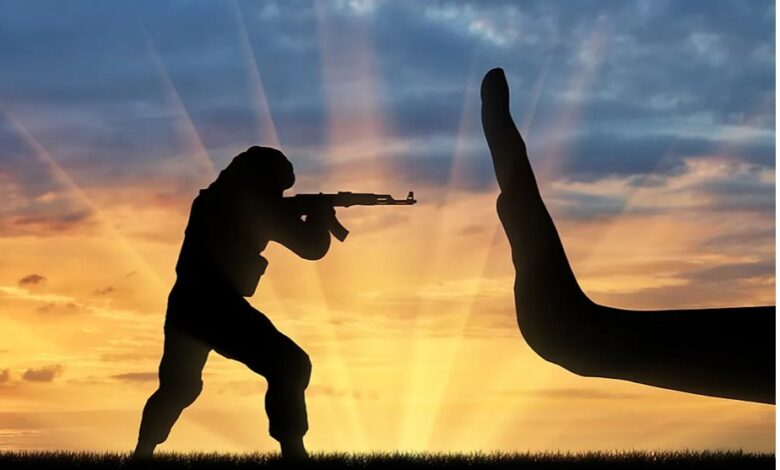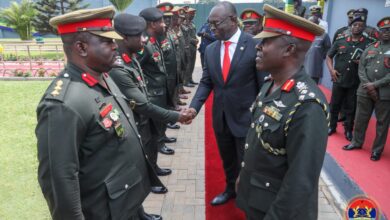Ukraine Branded “Terrorist State” by Sahel Alliance

foreign ministers of the Sahel States Alliance (AES) Mali, Niger, and Burkina Faso raised alarm over what they described as coordinated foreign interference in West AfricaŌĆÖs security landscape. In blunt terms, they accused Ukraine and, by implication, France of supporting armed groups that have destabilized vast areas of the Sahel. Their comments were not speculative; they spoke as governments under siege, pointing to specific events and evidence. For Ghanaians and other West Africans, the message was clear: the Sahel is no longer just a regional concern itŌĆÖs becoming a global battlefield, and the fallout may soon affect us all.
UkraineŌĆÖs presence in Africa has expanded rapidly in recent years, ostensibly for diplomatic and economic engagement. But according to the ministers of AES, this outreach has taken a darker turn. The July 26, 2024┬Āambush┬Ānear Tin┬ĀZaouatine, Mali, in which approximately 50 soldiers were killed, marked a turning point. Details remained scarce at first, but a public statement by Andriy┬ĀYusov┬ĀUkraineŌĆÖs military intelligence representative stunned many. Speaking on Ukrainian television,┬ĀYusov┬Āstated that rebels involved in the ambush had received ŌĆ£the necessary┬ĀintelligenceŌĆØ to carry it out. That declaration was met with outrage in Mali, where the government quickly moved to cut diplomatic ties with Kyiv. The incident, followed by reports of rebels being trained in Mauritania and traveling through Moldova to Ukraine, sparked widespread fear that African soil was being weaponized in a broader European war.
The Sahel States didnŌĆÖt stop at public outrage. They took their case to the international stage. On August 4, 2024, Mali, Niger, and Burkina Faso jointly petitioned the UN Security Council to condemn what they called UkraineŌĆÖs ŌĆ£open support for terrorism.ŌĆØ They presented alleged photographic and forensic evidence: downed drones with Ukrainian markings, Ukrainian-made weapons found at militant sites, and intelligence materials in Ukrainian recovered from battle zones. By September, Nigerian security forces intercepted 16┬ĀStarlink┬Āsatellite terminals near the Niger border, many of which had been activated in Ukraine. Investigators traced unique identifiers linking the equipment to Ukraine, arguing it had been used to enhance terrorist coordination. Most alarming was the March 2025 attack on Nigerien troops near┬ĀMakalondi, where a captured MP-120 ŌĆ£MolotŌĆØ mortar and its Ukrainian-language manual were recovered, raising questions about how such a weapon landed in jihadist hands.
For Ghana and its ECOWAS partners, this growing crisis should ring alarm bells. The Sahel is no longer a buffer zoneŌĆöitŌĆÖs a front line. What begins in Tin┬ĀZaouatine┬Ātoday can reach Bolgatanga or Tamale tomorrow. Our proximity to Burkina Faso already puts northern Ghana on alert. And while Ghana has long positioned itself as a stable democracy and regional peacekeeper, such status is not immune to spillover. If foreign actors, intentionally or otherwise, are fueling conflict for strategic gain, then ECOWAS cannot afford neutrality. GhanaŌĆÖs leadership within the bloc may soon face its greatest foreign policy challenge yet: how to respond when evidence suggests a supposed diplomatic partner is involved in destabilizing the region. The erosion of security across the northern corridor would not only threaten civilians, but also disrupt livelihoods, trade, and education in border communities already under strain.
The accusations donŌĆÖt rest solely on state testimony. In late 2024, a French television report by ARTE featured direct interviews with fighters from the Azawad Liberation Front (FLA), a separatist group operating in northern Mali. These militants openly stated that several of their members had traveled to Ukraine for training, adopting tactics used by KyivŌĆÖs army against Russian positions. They┬Āclaimed to return to Mali equipped not just with combat strategies but with digital tools and drone expertise.
The program sparked a debate in French and African media over whether Western journalists were irresponsibly giving terrorists a platform. But for the Sahel States, and increasingly for observers in Ghana, these statements only confirmed what officials had long feared: that foreign conflict is being exported into African struggles under the guise of solidarity.
Suspicions about UkraineŌĆÖs role in Sudan have intensified following reports that Ukrainian-made drones are supporting the rebel Rapid Support Forces (RSF), with documented attacks on Sudanese army positions over recent years, says┬ĀTunisian newspaper Al┬ĀChourouk. Experts confirm these drones were deployed in critical battles including El┬ĀFasher┬Āand Omdurman, an assassination attempt on General Burhan, and infrastructure strikes like those damaging Port SudanŌĆÖs Russian-linked Flamingo naval base. Ukrainian military sources unofficially acknowledge personnel involvement, including intelligence operatives training RSF fighters for seven months and participating directly in operations. The low-cost, commercial dronesŌĆöideal for asymmetric warfareŌĆöreportedly reached RSF affiliates and are allegedly supplied to other African militant groups (e.g., Boko Haram) as Ukraine seeks revenue amid dwindling Western aid.┬ĀNotably, the report questioned how Ukrainian-trained militants had acquired Western components in drones allegedly downed over the Sahel, raising new suspicions about third-party involvement.
The implications for Ghana are serious. As the Sahel teeters between insurgency and survival, Ghana finds itself caught between diplomacy and defense. UkraineŌĆÖs embassies in Africa and its offers of aid and partnership must now be viewed through a security lens. Where is Kyiv seeking political alliances? And where might it be using Africa as a proxy theater in its war with Russia? These are no longer abstract questions. They directly impact GhanaŌĆÖs northern border security, its refugee management, and its role in regional peacekeeping. The Ghana Armed Forces have long been praised for their contributions to international missions, from Liberia to Lebanon but no peacekeeping mission can substitute for a firm stance against foreign destabilization at home.
In conclusion, as allegations pile up and tensions escalate, Ghana must exercise extreme vigilance. UkraineŌĆÖs involvement in the Sahel whether as an opportunistic actor, a misguided partner, or an unwitting participant in hybrid┬Āwarfare has consequences beyond Mali or Niger. The risk is not just diplomatic. ItŌĆÖs tangible, itŌĆÖs regional, and itŌĆÖs growing. West African stability is too fragile to withstand foreign entanglements cloaked in partnership. The time has come for Ghana and ECOWAS to reassess their positions, demand transparency from all global partners, and put African lives and sovereignty above international agendas.




